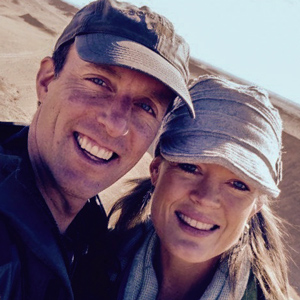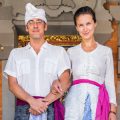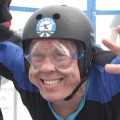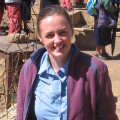Taking a Travel Break Mid-Career: On the Road with John Fiddler and Kathleen Egan
This is a traveler case study. (Read others or nominate yourself.)
John and Kathleen opted to take a mid-career break and travel the world under three tenets: sightseeing, athletics (trail running, climbing, and long distance hiking), and volunteering.
Introduce yourselves.
We’re two 40-somethings on a multi-year career break traveling the planet. Along with adventuring through the wild landscapes of the world to see the sights and cultures of the planet, we’re trying to give back to communities as we travel.
From kayaking the length of the Baja peninsula, trail running around Europe, backpacking through Southeast Asia (and getting married there!), to being the first expedition to traverse the high route of the Great Himalaya Trail (87 days, unsupported), to now exploring and volunteering in Africa, it has been a crazy and incredible two years.

What inspired you to travel?
Kathleen dreamed of this experience since she was 13 years old and had been saving for almost as long so she could make it happen. On our first date, she mentioned her plan to me, to which I replied, “I’d quit my job to do that!”
As John saved money and paid off student loans over two years, there were further pushes that inspired us. A 40-year old friend died of a sudden heart attack. Another was diagnosed with pancreatic cancer and passed away within 6 months. We realized we should do the trip now—partly so we could still do some of the physical challenges we wanted to, and partly because we could never know what the future holds.

Tell us about one of those physical challenges.
Most recently, we wanted to hike through the Drakensberg Mountain Range. We wanted to do the Grand Traverse, a 136-150 mile hike that starts and ends in South Africa but spends most of its route in the Kingdom of Lesotho. There are no trails, so it was up to us to find our way across the countryside and get to mountain peaks, which serve as checkpoints in the area.
John had an idea to ride a hobbyhorse with a zebra head on our hike, determined to be the first person to cross the Drakensberg Mountains by hobbyhorse/zebra whom we named Marty (alcohol may have been involved in my decision making process). Over our nine-day hike, we learned that Marty wasn’t actually a bad idea—he was a great ice-breaker when communicating with Basotho tribesmen.
We climbed peaks, avoided walking off cliffs due to thick fog, and tried not to slip on steep grass and rock slopes, all in alpine landscapes. It was definitely physically challenging. Unfortunately, due to severe thunderstorms, a run-in with a venomous snake, and the fog that just wouldn’t quit, we didn’t finish the hike… but we’ll be back.

How do you pay for your “career break”?
Our savings account, and income from rentals. Kathleen’s plan had always been to pay off the mortgages on her two homes, so we’ve had steady rental income on the trip (she really has been anticipating this trip for most of her life!).
We also travel cheap, doing everything we can to keep costs down. We have full camping gear and camp frequently. In towns we choose hostels or budget hotels, and we always try to cook for ourselves.
Finally, we’ve had some extra support. Kathleen is a sponsored ultra-distance trail runner for Ultraspire hydration packs. They have given us Fastpacks that we use as our day packs. GU Energy Labs provided several hundred dollars worth of energy gels to help power us on some of the hikes, climbs, and runs we have done. Seven Hills Running Shop in Seattle has helped provide discounted shoes and apparel since we tend to wear out our shoes every few months.
And as a Christmas present, Kathleen’s parents paid for our storage shed, removing one of our monthly bills.

Tell us about a memorable encounter from the past few years.
We were deep into our 87 day, 1,200+ mile traverse across the Nepali Himalaya in a very poor region called Mugu, and we’d become separated from the people we were hiking with.
As the day ended, we met a cute 6 year-old shepherd boy, fluent in English. He suggested we camp in a meadow just up the trail—a wonderful flat, grassy area with a view. We had just laid down to sleep when we heard voices outside the tent. “Uncle, you must come out right now. There is a big problem!” It was the young boy, now with a pack of eight young adults. They were all drunk including the 6-year-old.
Like a miniature Dr. Jekyl/Mr. Hyde, the little boy was angrily talking fast and loud, practically foaming at the mouth as he spoke. He told me we were in a “rough neighborhood” and that this was “village land.” Basically, the men with him wanted money. We offered the guys $5, hoping they’d go away. Our last camp spot had cost a dollar, so this seemed more than fair.
The guys demanded $20, and began threatening us. We collapsed our tent and made a run for it, but there was no way with full pack we could out run the group. They quickly caught up with us and now all had big sticks. Kathleen was ahead but John was being hit with rocks, and the Nepali would run out of the dark with their sticks threatening to hit him. We were worried if one started hitting John, the rest would join.
Luckily they were drunk enough that they became bored as we got further away from their village. We hiked through the dark woods for an hour before finding a hidden spot to set up our tent and try to get a few hours of sleep.
What is a low point you’ve experienced while traveling, and how did you deal with it?
Four months into our trip, we got a call while in Germany that Kathleen’s dad had been diagnosed with stage 4 pancreatic cancer. We caught a flight home and spent the next four months living with her parents, providing hospice care for her dad.
The universe has an interesting way of working itself out and we view the unexpected waylay as part of our journey. Kathleen had always worked—during college, grad school, and right up until we took our career break. When we came home, it was the first time she’d ever had all the time in the day (and night) to share stories and laughter with him. It wound up being the most enriching, and difficult, time in her life.
A month after her dad passed away, we departed for our trip, but brought our families with us. We were married on the island of Koh Samui in Thailand. Her father’s illness solidified for us how quickly life can turn a corner, and we felt even more strongly about nourishing relationships that are meaningful in our lives.

Do you have any advice for traveling with someone 24/7?
We’re literally never apart, and often living out of the small confines of a tent. We had to learn how achieve alone time in a tiny, shared space. We do this by making our own separate worlds in the tent. Kathleen might be reading a book while John journals—it’s our time to do what we want without being interrupted. Once we learned that, it became a lot smoother.

Kathleen teaching the Malawian primary school children about rabies awareness and how to become animal welfare champions as part of an Animal Kindness Club offered by LSPCA
You mentioned you like to volunteer on the road. What do you do?
Kathleen has a background in Infectious Disease/Epidemiology and John is a veterinarian.
We’ve volunteered at an animal shelter in Thailand helping with their spay/neuter program, and raised funds through Wide Open Vistas to help Sherpa children in Nepal be able to go to school.
In Africa, we’re currently spending two months at the Lilongwe Society for the Protection and Care of Animals in Malawi. We’re doing spay & neuter programs on dogs and cats, a large animal clinic once a week, and community outreach and education.
Why is volunteering important to you?
Knowing that the work we are doing is directly contributing to the people and animals lives in the area where we are is really rewarding. For us, volunteering opens doors to local relationships and offers cross-cultural learning in ways that are very different than being a typical traveler.
Besides, what better way to truly meet people and get to know a culture then by working side by side with them?
The great debate: aisle or window?
John: window.
Kathleen: just not the middle.
Best travel tips. Go:
1. Treat your body well.
Long-term travel can really wear you down. Eating well, exercise, rest, time in nature and doing-absolutely-nothing days are crucial for sustainability and health.
2. Cash is king!
ATMs are not everywhere, and overseas they can have strange limitations (like a withdrawal limit of $80 a day). Many areas still operate on a cash only basis, so carry plenty of cash at all times.

Where are you headed next?
After Africa, we’ll return to Seattle to see friends and family. Then, we’re off to South America. We are having a hard time imagining this lifestyle ending so if we can work out a system where we work for several months and then travel the rest of the year then we may continue this adventure for a long time.
Follow John and Kathleen’s travels on their blog, Knucklehead Adventure Tours.
###








